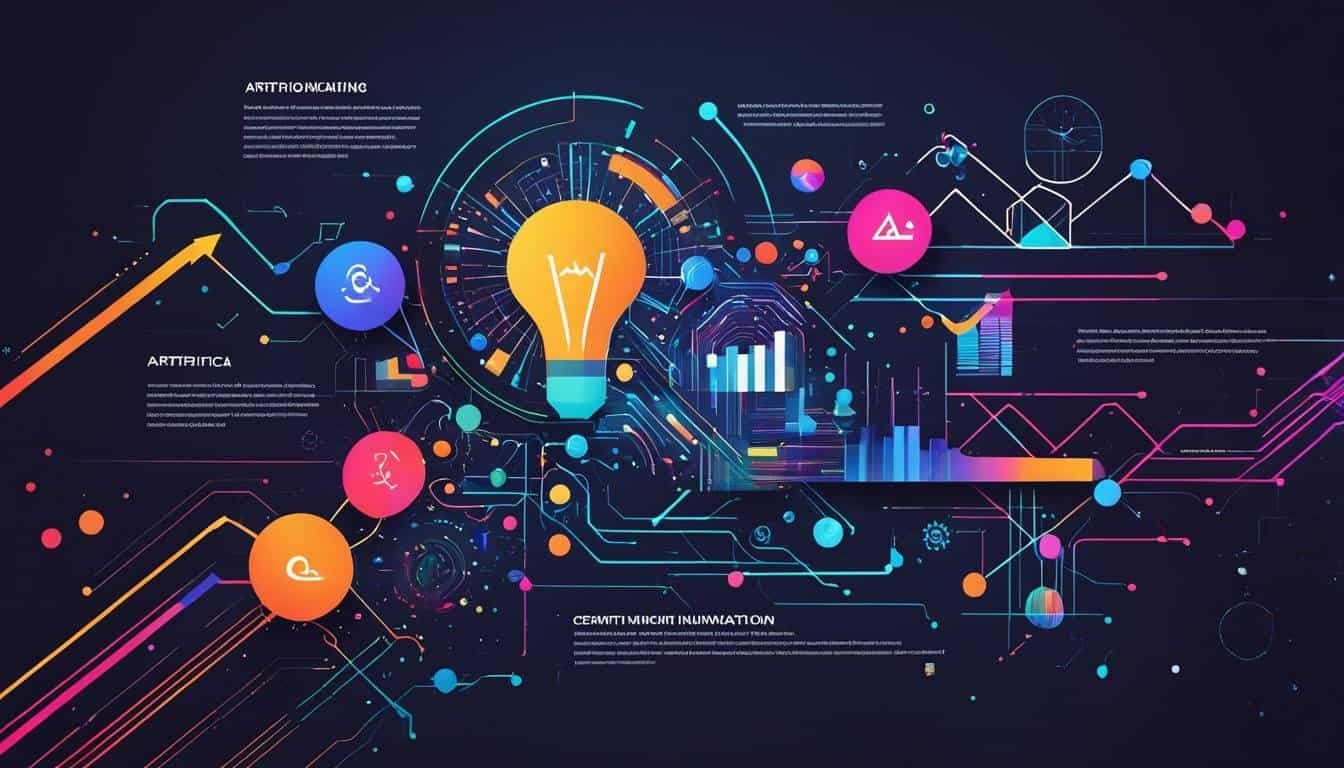Generative AI in Marketing: The Future of Advertising
The marketing industry is undergoing a remarkable transformation with the emergence of generative AI. This cutting-edge technology, powered by artificial intelligence, offers unprecedented capabilities in content generation, design, and strategy. With the ability to automate tasks and analyze vast amounts of data, generative AI is reshaping the future of advertising and revolutionizing the way marketers engage with their target audience.
From creating unique and fresh content to optimizing consumer touchpoint journeys, generative AI presents endless opportunities for marketers. By leveraging generative models, marketers can tap into the immense creative potential of AI to develop engaging campaigns and drive impactful brand experiences. With generative AI, marketers can unlock new realms of customer engagement and pave the way for smarter, data-driven marketing strategies.
- Generative AI is transforming the marketing industry, offering powerful solutions for content generation, design, and strategy.
- This technology leverages artificial intelligence to automate tasks and analyze large datasets, empowering marketers with efficient and data-driven advertising.
- Generative AI enables the creation of unique and fresh content, leading to engaging campaigns and enhanced customer experiences.
- Marketers can optimize consumer touchpoint journeys and develop personalized content using generative models.
- By embracing generative AI, marketers can gain a competitive edge in the ever-evolving advertising landscape.
What is Generative AI?
Generative AI is an innovative technology that focuses on generating unique and fresh content. It leverages the power of artificial intelligence and machine learning to create realistic and distinctive outputs, such as images, videos, and text. This process involves two key components: the generator and the discriminator.
The generator is responsible for creating content based on patterns it identifies in the provided data. It uses deep learning techniques to generate new and unique outputs, ensuring that the content remains fresh and engaging. On the other hand, the discriminator acts as a quality control mechanism, evaluating the generated content and providing feedback to the generator.
This collaborative process between the generator and the discriminator enables generative AI to continuously improve its outputs. By analyzing and learning from the feedback provided by the discriminator, the generator can refine its content generation capabilities, resulting in more accurate and high-quality outputs.
Generative AI can produce a wide range of content, including visually appealing images and captivating videos. This technology offers marketers the ability to explore new and innovative ideas, providing them with a competitive edge in content creation and engagement.
Generative AI enables marketers to generate unique and fresh content using advanced machine learning techniques. By continuously improving and refining the generated outputs, marketers can explore new and innovative ideas, creating engaging and captivating content.
Examples of Generative AI Applications:
- Creating realistic and visually appealing images for marketing campaigns
- Generating personalized videos for targeted advertising strategies
- Automatically generating unique and engaging product descriptions
- Creating customized recommendations based on user preferences
Benefits of Generative AI in Marketing:
Generative AI offers several key benefits for marketers:
- Unique Content: Generative AI enables the creation of fresh and engaging content that stands out from the competition.
- Efficiency: By automating content generation, marketers can save time and resources, allowing them to focus on other strategic initiatives.
- Personalization: Generative AI helps marketers deliver highly personalized experiences to their target audience, enhancing engagement and customer satisfaction.
- Innovation: By exploring new and innovative ideas, generative AI allows marketers to stay ahead of the curve, adapting to evolving consumer preferences.
To fully leverage the power of generative AI, marketers need to understand how it works and how to implement it effectively in their marketing strategies. The next section will explore the inner workings of generative AI and provide insights into its practical applications.
How Does Generative AI Work?
Generative AI, a technology that has been evolving since the 1960s, goes beyond the popular GPT-based models. It leverages the power of computers to autonomously create new data, including sentences, images, and consumer touchpoint journeys. This remarkable technology relies on machine learning algorithms to continuously improve its ability to generate high-quality and realistic content.
Generative AI in Action
Generative AI utilizes a range of techniques to create diverse forms of content. One such approach is through the use of language models, such as GPT-based models, which generate text based on training data. These models have been trained on vast amounts of text and can produce coherent sentences and paragraphs that closely resemble human-generated content.
Generative AI enables businesses to automate content creation and explore a multitude of creative possibilities. It can generate product descriptions, marketing copy, social media posts, and even entire articles with minimal human intervention.
In addition to text generation, generative AI is also capable of producing visual content. Using techniques such as deep learning and neural networks, it can create images that are indistinguishable from those captured by a camera. By simulating the patterns and features found in existing images, generative AI can generate new and unique visuals that captivate viewers.
The Role of Machine Learning
At the heart of generative AI lies machine learning algorithms. These algorithms allow the AI system to learn patterns and structures from vast amounts of data. By analyzing this data, the AI system gains an understanding of the underlying patterns and can generate new content that aligns with these patterns.
Training a generative AI system involves feeding it with large and diverse datasets. This data serves as the foundation for the system to learn and model different features and patterns. The more data the system is exposed to, the better it becomes at generating content that aligns with the desired output.
- Collect and preprocess relevant data
- Train the generative AI model using the collected data
- Iteratively fine-tune the model to improve its output quality and coherence
This continuous training and fine-tuning process enables generative AI models to produce increasingly realistic and high-quality outputs.
The Potential of Generative AI
With generative AI, businesses can unlock unprecedented opportunities for creativity and innovation. Whether it’s creating compelling marketing campaigns, designing captivating visuals, or automating content creation, generative AI opens doors to new possibilities.
By leveraging the power of machine learning and data creation, generative AI empowers marketers to generate content that resonates with their target audience and drives engagement. It represents a transformative force in the marketing landscape, allowing businesses to stay ahead in a competitive market.
| Benefits of Generative AI in Marketing | Challenges of Generative AI in Marketing |
|---|---|
|
|
Uses Cases of Generative AI in Marketing
Generative AI, with its advanced capabilities, offers numerous use cases and opportunities for marketers to enhance their strategies. By leveraging generative AI, marketers can harness the power of efficient data analysis, predictive modeling, personalized content creation, chatbots, and targeted advertising to drive better engagement and deliver highly tailored experiences to their audience.
Efficient Data Analysis
Generative AI enables marketers to efficiently analyze and extract valuable insights from large datasets. By leveraging machine learning algorithms, marketers can uncover hidden patterns and trends that traditional methods might miss. This data-driven approach allows for smarter decision-making and more targeted marketing campaigns.
Predictive Modeling
Generative AI empowers marketers with predictive modeling capabilities, enabling them to forecast future trends and outcomes based on historical data. By leveraging this technology, marketers can optimize their strategies, allocate resources more effectively, and make data-driven decisions to maximize their marketing ROI.
Consumer Journeys
Generative AI plays a vital role in understanding and reconstructing consumer journeys. By analyzing data from various touchpoints, marketers can gain valuable insights into customer behaviors, preferences, and pain points. This information allows for the creation of highly personalized and targeted marketing campaigns, ensuring that the right message reaches the right audience at the right time.
Personalized Content Creation
Generative AI revolutionizes content creation by enabling marketers to generate personalized content at scale. By leveraging customer data and preferences, generative AI can automatically create tailored content that resonates with individual customers. This highly relevant content enhances customer engagement and strengthens brand loyalty.
Chatbots
Chatbots powered by generative AI provide efficient and personalized customer interactions. With natural language processing capabilities, chatbots can understand and respond to customer inquiries, provide product recommendations, and offer personalized assistance. This automation streamlines customer service processes, improves customer experiences, and frees up human resources for more complex tasks.
Targeted Advertising
Generative AI enables marketers to create highly targeted and personalized advertising campaigns. By analyzing customer data and preferences, generative AI can generate tailored advertisements that resonate with individual consumers. This targeted approach increases the likelihood of conversions and drives better marketing results.
Incorporating generative AI into marketing strategies empowers marketers to deliver more personalized, relevant, and engaging experiences to their audience. By utilizing efficient data analysis, predictive modeling, consumer journey insights, personalized content creation, chatbots, and targeted advertising, marketers can stay ahead of the competition and drive better business outcomes.
| Generative AI Use Cases | Benefits |
|---|---|
| Efficient Data Analysis | Uncover valuable insights from large datasets Optimize decision-making Drive targeted marketing campaigns |
| Predictive Modeling | Forecast future trends and outcomes Optimize resource allocation Maximize marketing ROI |
| Consumer Journeys | Understand and reconstruct customer behaviors Create personalized and targeted campaigns Enhance customer experiences |
| Personalized Content Creation | Generate tailored content at scale Enhance customer engagement Strengthen brand loyalty |
| Chatbots | Efficient and personalized customer interactions Streamline customer service processes Improve customer experiences |
| Targeted Advertising | Create highly targeted and personalized campaigns Increase conversions Drive better marketing results |
Benefits of Generative AI in Marketing
Generative AI offers several benefits for marketing. Through its advanced capabilities, it contributes to increased efficiency, enhanced customer engagement, cost-effective strategies, and continuous learning.
One of the significant advantages of generative AI is the automation of tasks. By automating repetitive and time-consuming processes, marketers can focus their energy on strategic initiatives rather than mundane operational activities. This increased efficiency allows for better resource allocation and improved productivity.
Moreover, generative AI plays a crucial role in delivering personalized experiences to customers. By harnessing the power of data and machine learning algorithms, it can analyze customer preferences, behaviors, and interactions to create tailored content. This enhanced customer engagement fosters stronger connections, improves brand loyalty, and drives conversion rates.
Generative AI also enables cost-effective marketing strategies. By automating content creation and optimization, marketers can achieve a significant reduction in time and resources spent on manual efforts. This results in cost savings and a faster time-to-market for campaigns, allowing businesses to stay competitive in a dynamic marketplace.
Additionally, generative AI facilitates continuous learning. By analyzing user interactions and feedback, it can iteratively improve its outputs, ensuring that marketing efforts are constantly optimized. This adaptive approach allows marketers to stay ahead of market trends, refine their strategies, and deliver better results over time.
“Generative AI in marketing enhances efficiency, customer engagement, cost-effectiveness, and continuous learning.”
Overall, generative AI in marketing presents a transformative opportunity for businesses. By leveraging its capabilities, marketers can achieve increased efficiency, enhanced customer engagement, cost-effective strategies, and continuous learning. Embracing generative AI empowers organizations to stay competitive and deliver exceptional experiences in an ever-evolving digital landscape.
Strategies for Implementing Generative AI in Marketing
Implementing generative AI in marketing requires careful planning to ensure successful integration and optimal outcomes. To effectively harness the power of generative AI, marketers should consider the following strategies:
1. Define Clear Marketing Goals
Before implementing generative AI, it is crucial to define specific and measurable marketing goals. This will help guide the AI models towards generating content that aligns with the desired outcomes. Whether it is increasing brand awareness, driving lead generation, or improving customer engagement, clearly defined marketing goals lay the foundation for effective implementation.
2. Identify Relevant Data Sources
Identifying and collecting relevant data sources is essential for training generative AI models. Marketers should analyze and gather data that is representative of their target audience, industry trends, and market dynamics. By incorporating diverse and accurate data, AI models can generate content that resonates with the target audience and drives desired marketing outcomes.
3. Train and Fine-Tune Models
Training the generative AI models using the collected data is a critical step in the implementation process. Marketers need to fine-tune the models to ensure they produce high-quality and relevant content. Iterative training and feedback loops help improve the accuracy and effectiveness of the generated content, enabling marketers to achieve their marketing goals.
4. Evaluate and Optimize Generated Content
Regular evaluation of the generated content is necessary to assess its quality and relevance. Marketers should establish evaluation metrics to determine whether the content meets the desired standards. By analyzing the generated content, marketers can identify areas for improvement and optimize the AI models to produce even more impactful content.
5. Choose the Right AI Tool
Choosing the right AI tool is crucial for successful implementation of generative AI in marketing. Marketers should consider factors such as the tool’s compatibility with their existing systems, its ease of use, and its ability to scale with their marketing requirements. Evaluating multiple AI tools and selecting the one that best suits their needs and goals will result in a more seamless integration process.
6. Prioritize Security Measures
With the increasing use of AI in marketing, ensuring data security and privacy is paramount. Marketers should prioritize implementing robust security measures to protect sensitive customer data and intellectual property. This can include encryption, access control, and regular security audits to mitigate potential risks and maintain trust with customers.
Implementing generative AI in marketing requires a comprehensive approach that encompasses defining goals, identifying data sources, training models, evaluating content, choosing the right AI tools, and prioritizing security. By following these strategies, marketers can leverage the power of generative AI to drive innovation, improve customer engagement, and achieve marketing success.
| Benefits | Challenges |
|---|---|
| Increased efficiency in content generation | Varying content quality |
| Enhanced customer engagement with personalized experiences | Data limitations impacting accuracy |
| Cost-effective marketing strategies | |
| Continuous learning and improvement based on user interactions |
Challenges and Potential Risks of Generative AI in Marketing
While generative AI presents tremendous potential for enhancing marketing strategies, there are notable challenges and risks that marketers need to consider. These challenges primarily revolve around content quality and data limitations.
Content Quality
One of the key challenges of generative AI in marketing is ensuring consistent content quality. While AI algorithms have advanced significantly, they may still produce outputs that do not meet the desired standards. The generated content can vary in terms of relevance, coherence, and accuracy, necessitating human expertise to refine and fine-tune the output. It is essential to strike a balance between automation and human intervention to maintain high-quality content that resonates with the target audience.
Data Limitations
Data limitations pose another significant challenge to the accuracy and effectiveness of generative AI models in marketing. These models rely heavily on the datasets used for training and may not distinguish between trusted and untrusted sources of data. This lack of discrimination may lead to biases or inaccuracies in the generated content. It is crucial for marketers to carefully curate and validate the data used to train these models, ensuring that the inputs are representative, reliable, and diverse.
Overall, while generative AI opens up new possibilities in marketing, the challenges of content quality and data limitations need to be carefully navigated. By addressing these challenges, marketers can leverage the power of generative AI to create compelling and engaging content that drives results.
| Challenges | Potential Solutions |
|---|---|
| Content Quality | Combining AI automation with human expertise to refine and fine-tune generated content. |
| Data Limitations | Carefully curating and validating training data to ensure representative and reliable inputs. |
The Future of Generative AI in Marketing
Generative AI is poised to shape the future of marketing, offering innovative solutions and driving industry growth. With advancements in optimization, accessibility, and training and inference techniques, generative AI is expected to revolutionize marketing practices across various industries.
Companies are actively working on optimizing generative AI models to make them more accessible to businesses of all sizes. Tools like SetFit from Intel Labs demonstrate the potential for training smaller models on reduced datasets while maintaining accuracy. This optimization opens doors for organizations that may have previously been unable to harness the power of generative AI due to resource limitations.
Furthermore, the potential reach of generative AI extends beyond the marketing industry. As AI technology continues to advance and mature, generative models are expected to find applications in diverse fields such as law and medicine. In these domains, generative AI can streamline processes, save time, and enable more efficient workflows.
Key Benefits of Generative AI in Marketing:
- Enhanced creativity and content generation possibilities
- Efficient data analysis and pattern recognition
- Improved customer engagement through personalized experiences
- Cost-effective strategies powered by automation
- Continual learning and adaptation to evolving market trends
As generative AI continues to evolve and gain prominence, marketers must stay abreast of the latest developments in order to leverage its full potential. Understanding the optimization techniques, accessibility advancements, and training and inference methodologies will empower marketers to make informed decisions when implementing generative AI strategies in their campaigns.
In conclusion, the future of generative AI in marketing is promising. With ongoing research and development, this technology will continue to optimize content generation, enhance customer experiences, and drive marketing innovation. By embracing generative AI, businesses can stay ahead of the competition and thrive in the ever-evolving advertising landscape.
Future Applications of Generative AI in Marketing Across Industries
| Industry | Potential Applications |
|---|---|
| Retail | – Personalized product recommendations – Dynamic pricing strategies – Virtual shopping assistants |
| Entertainment | – Content creation and curation – Personalized movie and music recommendations – Virtual AI entertainers |
| Finance | – Fraud detection and prevention – Advanced risk assessment – Personalized financial advice |
| Healthcare | – Medical diagnostics and image analysis – Personalized treatment plans – Drug discovery and development |
Conclusion
Generative AI is revolutionizing marketing by harnessing the power of automation, data analysis, and content generation. This innovative technology offers tremendous potential for the future of advertising.
While there are challenges and limitations, marketers who embrace generative AI and adapt to its capabilities will gain a competitive edge in the ever-evolving advertising landscape. By leveraging generative AI’s ability to automate tasks, marketers can free up valuable time to focus on strategic planning and creative thinking.
Generative AI also enables marketers to analyze large datasets and uncover valuable insights that drive more effective marketing campaigns and personalized customer experiences. By generating unique and engaging content, marketers can captivate their target audience and create memorable brand interactions.
The future of generative AI in marketing holds immense promise. As the technology continues to evolve, companies are investing in optimizing models and making AI more accessible. In addition to revolutionizing marketing, generative AI has the potential to transform various other industries, streamlining processes, and saving time.
Source Links
- https://www.marketingevolution.com/knowledge-center/generative-ai-and-the-future-of-marketing
- https://www.linkedin.com/pulse/generative-ai-advertising-marketing-glimpse-present-future-dingra
- https://www.kantar.com/inspiration/analytics/the-future-of-generative-ai-in-advertising-efficiency-without-effectiveness






